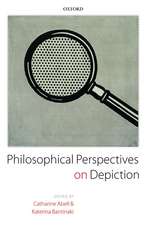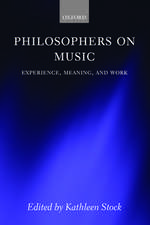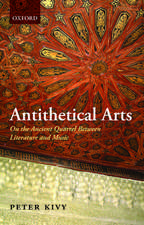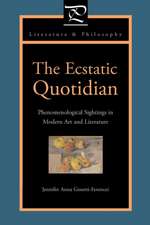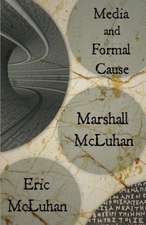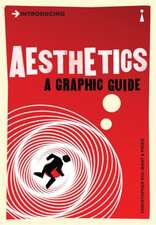The End of Art: Readings in a Rumor after Hegel
Autor Eva Geulen Traducere de James McFarlanden Limba Engleză Hardback – 10 sep 2006
Since Hegel, the idea of an end of art has become a staple of aesthetic theory. This book analyzes its role and its rhetoric in Hegel, Nietzsche, Benjamin, Adorno, and Heidegger in order to account for the topic's enduring persistence. In addition to providing a general overview of the main thinkers of post-Idealist German aesthetics, the book explores the relationship between tradition and modernity. For despite the differences that distinguish one philosopher's end of art from another's, all authors treated here turn the end of art into an occasion to thematize and to reflect on the very thing that modernism cannot or should not be: tradition. As a discourse, the end of art is one of our modern traditions.
| Toate formatele și edițiile | Preț | Express |
|---|---|---|
| Paperback (1) | 168.55 lei 22-36 zile | |
| Stanford University Press – 10 sep 2006 | 168.55 lei 22-36 zile | |
| Hardback (1) | 642.86 lei 43-57 zile | |
| Stanford University Press – 10 sep 2006 | 642.86 lei 43-57 zile |
Preț: 642.86 lei
Preț vechi: 793.65 lei
-19% Nou
Puncte Express: 964
Preț estimativ în valută:
123.02€ • 127.66$ • 102.83£
123.02€ • 127.66$ • 102.83£
Carte tipărită la comandă
Livrare economică 17-31 martie
Preluare comenzi: 021 569.72.76
Specificații
ISBN-13: 9780804744232
ISBN-10: 0804744238
Pagini: 216
Dimensiuni: 152 x 229 x 18 mm
Greutate: 0.41 kg
Ediția:1
Editura: Stanford University Press
Colecția Stanford University Press
ISBN-10: 0804744238
Pagini: 216
Dimensiuni: 152 x 229 x 18 mm
Greutate: 0.41 kg
Ediția:1
Editura: Stanford University Press
Colecția Stanford University Press
Recenzii
"Geulen's book succeeds in bringing new significance, renewed continuity, and robust meaning to a large portion of this endlessly productive tradition."—xNotre Dame Philosophical Reviews
"Geulen's rich and rewarding inquiry into modern German aesthetics never loses sight of a single question: not "why is art at its end?" but rather "why is there a compulsion to say art has come to an end?" By seeking the genesis and structure of this compulsion, Geulen provides a major reassessment of the paradoxical tradition of aesthetic reflection that takes its point of departure from Hegel's difficult pronouncement that the age of great art has come to a close." —Peter Fenves, Northwestern University
Notă biografică
After having taught German for many years in the United States, most recently at New York University, Eva Geulen now teaches German at the University of Bonn, Germany. She is the author of German-language books on Adalbert Stifter (2002) and Giorgio Agamben (2005).
Textul de pe ultima copertă
"Geulen's book succeeds in bringing new significance, renewed continuity, and robust meaning to a large portion of this endlessly productive tradition."—xNotre Dame Philosophical Reviews
“Geulen's rich and rewarding inquiry into modern German aesthetics never loses sight of a single question: not “why is art at its end?” but rather “why is there a compulsion to say art has come to an end?” By seeking the genesis and structure of this compulsion, Geulen provides a major reassessment of the paradoxical tradition of aesthetic reflection that takes its point of departure from Hegel's difficult pronouncement that the age of great art has come to a close.” —Peter Fenves, Northwestern University
“Geulen's rich and rewarding inquiry into modern German aesthetics never loses sight of a single question: not “why is art at its end?” but rather “why is there a compulsion to say art has come to an end?” By seeking the genesis and structure of this compulsion, Geulen provides a major reassessment of the paradoxical tradition of aesthetic reflection that takes its point of departure from Hegel's difficult pronouncement that the age of great art has come to a close.” —Peter Fenves, Northwestern University
Descriere
Readings of Hegel, Nietzsche, Benjamin, Adorno, and Heidegger trace the role that the discourse on the end of art has played in post-Hegelian philosophical aesthetics.




